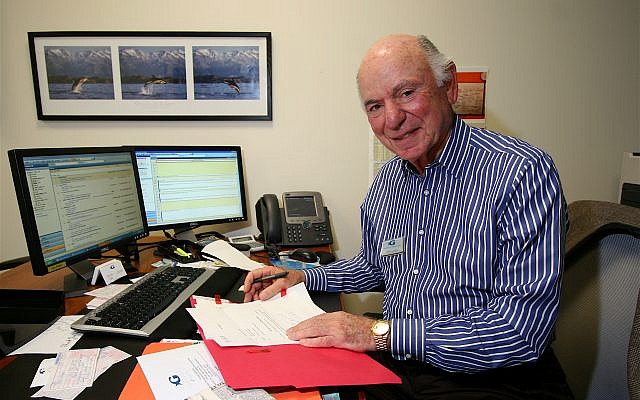Pledging Today for Tomorrow’s Jewish Future
Over the next 25 years, a staggering amount of money – estimates range as high as $60 trillion – will transfer from the Baby Boomers to the millennials and Gen Z.
Dave Schechter is a veteran journalist whose career includes writing and producing reports from Israel and elsewhere in the Middle East.
Mike Leven is not the type to sit back and assume that someone else will take care of a problem.
Addressing issues head-on is how Leven came to be referred to as an “industry icon” and a “marketing genius” in a decades-long career in the hotel and hospitality industry.
Leven, currently the chairman and CEO of the Georgia Aquarium, has turned his attention to what he sees as a potential lost opportunity for American Jewry.
Over the next 25 years, a staggering amount of money – estimates range as high as $60 trillion – will transfer from the Baby Boomers to the generations known as the millennials and Gen Z.
An estimated $6.3 trillion is earmarked for charitable use, of which about 5 percent – more than $315 billion – will be in Jewish hands, Leven said at the recent annual meeting of the Jewish Federation of Greater Atlanta.
And therein, Leven said, lies the concern identified by multiple surveys of American Jews: “Each new generation’s relationship to Judaism is becoming more and more disconnected.”
A 2017 report by the Public Religion Research Institute found that about one-third of Americans who identify as Jewish were “cultural Jews,” with no religious attachment, but that 53 percent of those younger than 30 qualified as “cultural Jews.”
As Leven sees it, the risk in this disconnect is that wealth passed from one Jewish generation to the next will not be spent Jewishly.
“This could happen due to a lack of conversation,” Leven said. He is determined that this conversation take place, and that it begins in Atlanta.
Capturing even 50 percent of that $315 billion in Jewish charitable funds could amount to nearly $160 billion, including interest accruing from continued investment. But even that estimate may be low. Forbes reported in 2018 that 19 percent of the world’s wealthiest 200 people are Jewish. If, potentially, that high a percentage of charitable funds are in Jewish hands, then the $315 billion figure may be more in the $1 trillion range – and half of that would be about $500 billion.
“We have a monumental opportunity for sustaining the Jewish future, to sustain the Jewish people, not only here, but in Israel and all over the globe,” Leven told those attending the Federation meeting. “The job is to come up with a system that will allow us to capture that money.”
That system, as Leven envisions it, is the “Jewish Future Pledge,” an initiative that will be road-tested in Atlanta. “We are trying to create a movement right here, starting in the Atlanta Federation, to secure the Jewish future,” Leven said.

The first part reads: “I hereby pledge that at my passing, at least 50 percent of all my assets left for charitable purposes will be directed to strengthen and serve the Jewish people and/or the State of Israel.”
Leven’s goal is that 180 members of the Atlanta Jewish community sign “My Jewish Future Pledge.” A stack of pledge sheets was left on tables at the Federation annual meeting. At this writing, a figure on the number of pledges signed and returned was not available.
The Federation is partnering with the initiative through its Atlanta Jewish Foundation.
“We don’t need the money now. What we need is to make sure that through your heirs, you have charitable dollars to give and that at least 50 percent will go Jewishly,” Leven said.
One investment vehicle is donor-advised funds. The money placed in these funds is owned by the Federation, as the sponsoring organization. Donor requests for allocation of these funds, often but not always in the short-term, generally are followed if the recipient is a qualifying tax-exempt organization.
The donor, who receives a tax deduction for the amount deposited in the fund, can designate who will hold adviser status after their death, a way to involve children and grandchildren in philanthropy.
Another method is the Life & Legacy program, in which specific amounts of money are bequeathed to local Jewish organizations and institutions. In its first year, the Federation received more than $14 million in commitments for such gifts.
The Foundation also can create endowments and advise on other forms of giving.
“Right now it’s just a pledge, but what the Foundation can go back and do is for all these people who have signed pledges, we can be the avenue that will help you to legalize it and formalize it to set it up,” said Renee Kutner, the Federation’s vice president of marketing.
Through these funds, “we are actively securing now the future of this community with commitments,” Kutner said.
Leven’s partner in getting the pledge program up and running is Amy Holtz, of Philadelphia, who left a successful business career to involve herself in a number of personal and professional Jewish enterprises.
Holtz said that when the pledge was presented at a meeting with 25 “mega-donors” in Atlanta’s Jewish community, everyone present said they would sign.
She is particularly enthused about a second, non-financial part of the initiative, an “intangible” aspect that Leven did not mention at the Federation annual meeting.
“We are asking you to write a legacy letter,” to tell your children and grandchildren “what are your life lessons, what did you learn, why is it important for you to be Jewish, why do you care,” Holtz said.
“This is not just for rich people,” Holtz said, “because all the Jewish people have a stake in the Jewish future. It belongs to all of us. We want this to be for everybody. Everybody has life lessons to share.”
Such a document has meaning well beyond guidance on how money is to be spent, but rather how a life is to be lived with meaning, Holtz said.
“You’re going to tell them what’s in your heart,” she said, referencing wisdom from the Torah that “words from the heart go to the heart.”




comments